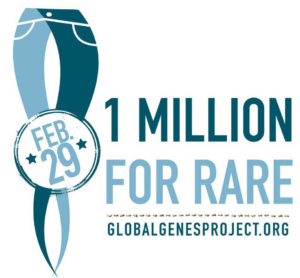
Today, February 29, is Rare Disease Day, a concept first initiated by the European Rare Disease Organization (EURORDIS) and now recognized worldwide.
When we think about diseases we often describe them as either common or rare. Common conditions – like heart disease and obesity – are complex in nature, meaning they are influenced by genetics and the environment. Conversely, most rare diseases are strongly influenced by genetics and less so by the environment. We hear a lot about common conditions because so many people have them, and in contrast, relatively little about rare diseases. But how rare is rare?
In the United States, a disease is defined as “rare” if it affects fewer than 200,000 individuals or roughly one in 1500. Rare diseases are often poorly understood, with symptoms that can be difficult to diagnose and can be life-threatening. Around 6,800 rare diseases have been identified and the large majority of them – up to 80% – are thought to have a genetic origin. Most rare diseases can’t be cured, and many lack effective treatments because research on rare conditions is often hampered by a scarcity of study participants and poor funding.

Join the Global Genes Projectâ„¢ and help unite one million people for rare diseases. The Global Genes Projectâ„¢ is a campaign that works to help individuals and organizations participate in this annual day of recognition for rare diseases. Getting involved can be as simple as putting on a pair of genes (ahem, jeans) – because 80% of rare diseases have a genetic origin – or as involved as organizing a local Denim & Genes event.
If you add up all the rare diseases, about 30 million Americans suffer from a rare disease. That’s nearly 10% of the population—suddenly, rare is not so rare! You’ve likely heard of at least some of these conditions, and 23andMe provides health reports for many of them, from cystic fibrosis to sickle cell anemia.
23andMe believes that our innovative research model can improve the treatment of rare diseases. So far, we’ve launched research initiatives for two rare diseases—myeloproliferative neoplasms (MPNs) and sarcoma—to better understand their causes and help bring about treatments. We are currently enrolling participants in both studies, so join our cause if you suffer from one of these disorders or know of someone who does.



